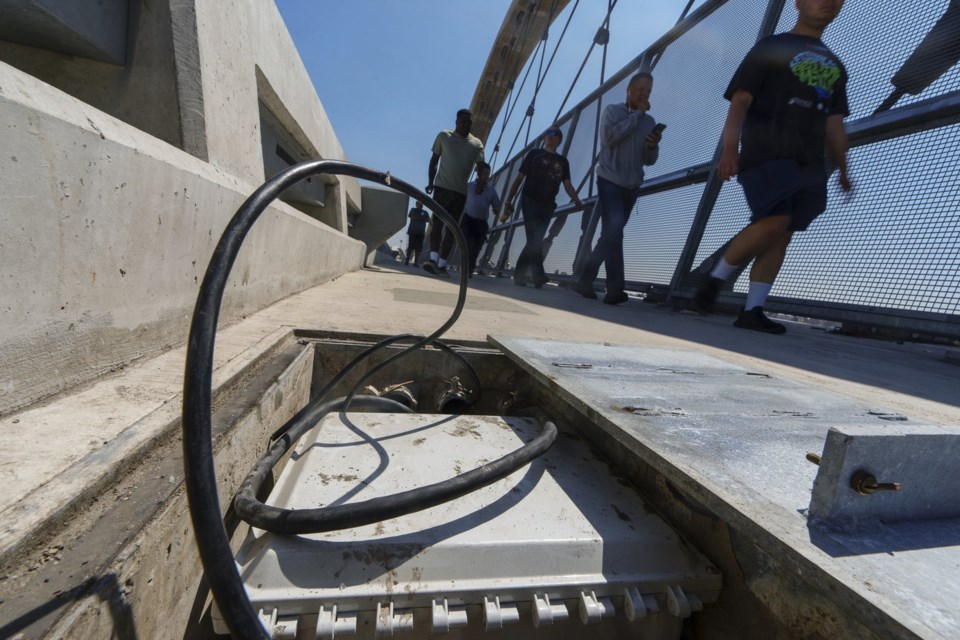Canadian telecommunications companies are calling for stiffer penalties targeting copper wire theft and new rules that would limit the vandals' ability to resell the material.
Executives from Bell Canada and Telus Corp. told the Senate's transport and communications committee on Wednesday evening that the problem continues worsen, wreaking havoc on emergency services and business operations when their networks are disrupted.
Since January 2022, Bell has seen more than 1,650 security incidents targeting its infrastructure, around 88 per cent of which related to copper theft, Michele Austin, the company's vice-president of public affairs, told the committee.
She said Bell saw 78 per cent more incidents of copper theft last month compared with November 2023.
Such incidents "are having a profoundly negative impact on Canadians and on the economy," said Austin, noting a recent example in Preston, Ont., where more than 1,000 phone lines were cut and customers lost service for about 60 hours.
"Businesses can鈥檛 process transactions. Airports have to stop ticketing passengers and sometimes have to cancel flights," she said.
Austin said Ottawa should amend the Criminal Code to outline specific offences when someone commits mischief or theft targeting telecom networks, services or infrastructure.
Brian Lakey, the vice-president of the Reliability Centre of Excellence at Telus, said classifying damage to telecom infrastructure as a more serious crime would act as a deterrent, as would imposing stronger penalties.
He noted copper theft is usually considered a "petty theft," or theft under $5,000.
"This is the same charge level against someone caught stealing a bicycle, yet the consequences of copper theft are much greater," said Eric Smith, senior vice-president of the Canadian Telecommunications Association.
Lakey also called for an amendment to the Telecommunications Act to prohibit and impose fines on the sale of illegally obtained telecom material.
"This will disrupt the supply chain for stolen copper," he said, adding provinces also have a role to play in "closing loopholes that allow criminals to profit from stolen copper."
Lakey said provinces should standardize regulations around scrap metal dealing and recycling. One way to do this would be through rules limiting the sale of melted down copper that is no longer traceable.
The Senate committee heard earlier in the week from public safety and law enforcement officials who described challenges in dealing with the issue. RCMP Chief Supt. Peter Tewfik told the group it can be difficult to identify and link stolen metals back to an owner because copper can be melted down, erasing any identifiers before the material is sold by the thief to a scrapyard.
Tewfik also said copper wire infrastructure often lacks security, such as fencing, lights, cameras or patrols, which makes it hard to prevent theft.
Lakey said Telus has boosted its spending on security measures such as floodlights, video cameras and specialized locking equipment, "however these deterrents are not enough."
Since 2021, more than 170,000 Telus customers have lost service due to copper theft, including multiple incidents this year in cities such as Calgary and Abbotsford, 小蓝视频, he told the committee.
"Copper thieves are becoming increasingly sophisticated and organized," he said.
Earlier this year, Ottawa passed the Countering Foreign Interference Act, which criminalizes acts of sabotage against essential infrastructure, including telecom networks.
But while that legislation penalizes crimes "harmful to Canada's national interests," Smith said the telecom industry is concerned it would be difficult to prove such intent in cases involving copper theft.
He said there is a need to "fill the gap that exists in Canadian law," including through stronger rules around sales at scrapyards.
"We're not asking them to be law enforcement, but we are asking them, like other industries who have to follow regulations, to follow simple steps," Smith said.
This report by The Canadian Press was first published Dec. 12, 2024.
Companies in this story: (TSX:小蓝视频E, TSX:T)
Sammy Hudes, The Canadian Press




